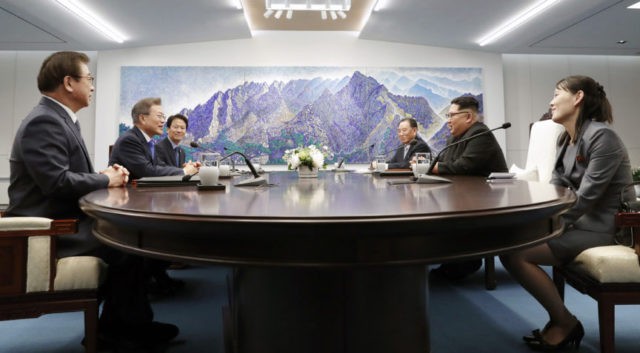North Korean dictator Kim Jong-un and South Korean President Moon Jae-in met for the first time on their border today, reportedly discussing an end to the Korean War, family reunification, and joint infrastructure projects.
Left off the docket, apparently, was any discussion of the dire human rights situation the average North Korean faces on a regular basis, or any pressure on the part of Seoul for Kim to stop torturing and murdering his people.
The outside world knows about these abuses—people shot to death by anti-aircraft fire, tortured by being forced to sit in cold muddy cells for hours, starved to the point of being forced to eat grass to survive—almost entirely thanks to the bravery of refugees who fled the country and were brave enough to publicly tell their stories. North Korean defectors, as the refugees are typically called, began the 2018 conversation on changing the nature of the Kim regime thanks to the visibility President Donald Trump granted them during his State of the Union Address.
On Friday, in Panmunjom, the voice of defectors was nowhere to be found.
Instead, there was a joint declaration from Kim and Moon that the two would “completely cease all hostile acts against each other in every domain,” build roads through each other’s countries, and “urgently resolve” the tragic separation of broken families. They vowed to work towards the full denuclearization of the Korean peninsula—a promise that allows North Korea to morally equate the presence of U.S. military assets in Korea with its own illegal nuclear program.
Kim Jong-un ensured that, in addition to the business statement, reporters would hear plenty of jokes.
“I heard that you had tossed and turned early in the morning as you had to participate in National Security Council sessions. … You should be accustomed to waking up early (by now),” Kim told Moon, promising not to wake him up with early-morning missile tests.
Kim also joked about how he would be “embarrassed” if Moon saw the sorry state of North Korea’s transit system and how, with greater ease of travel between the two Koreas, “the demarcation line, which is in fact not high, may disappear with many people stepping on it and passing over it.”
It was Kim who mentioned the defectors.
“North Korean defectors and displaced people do have high hopes for our meeting today,” he reportedly told Moon.
No reports available at press time indicate that Moon pressured Kim on the gross human rights violations that forced those defectors out of the country.
An estimated 32,000 North Koreans live in South Korea as refugees, according to the nation’s Arirang News. Arirang interview a Christian leader in that refugee community who expressed concern that the North Korean people on either side of the border may be left behind as world leader hurtled towards “peace.”
“Many people are still being killed due to the repression under the regime, and prisoner camps are still operating in North Korea. That is why I think it would be rather empty to talk about the Korean Peninsula’s security without first solving the humanitarian issues,” Rev. Kang Chul-ho of the North Korea Refugee Church told the outlet. Kang specifically mentioned the need for family reunification, citing “meeting our own family” as “a fundamental right for human beings.”
“No matter the outcome of these summits, our goal will still ultimately be regime change,” Choi Jung-hoon, a refugee who fled the North Korean army, told the Washington Times. Choi still works and advocates for the end of the communist regime, and expressed concern that “if these summits turn out to be successful, our work will become like a burden for the government in the South.”
Ahn Chan-il, the president of the World Institute for North Korea Studies and himself a North Korean defector, told UPI shortly before the summit that he believes South Korea is already trying to silence his dissenting voice. Ahn told UPI that, after appearing regularly on South Korean television, he abruptly stopped being invited on after dismissively referring to Kim Yo-jong, the dictator’s sister, as “that woman.”
“Ahn said all defector interviews on television and radio have decreased by about 80 percent at least since the 2018 Pyeongchang Winter Olympics,” UPI reports, “but added it is unclear whether explicit instructions from the South Korean government were responsible for defector absences in media.”
Ahn told UPI that he believes North Korea is “overjoyed” at South Korea and the West opening an opportunity up to legitimize him.
“Human rights could be used as pressure against Kim. It’s not good that it is not being raised,” he lamented.

COMMENTS
Please let us know if you're having issues with commenting.